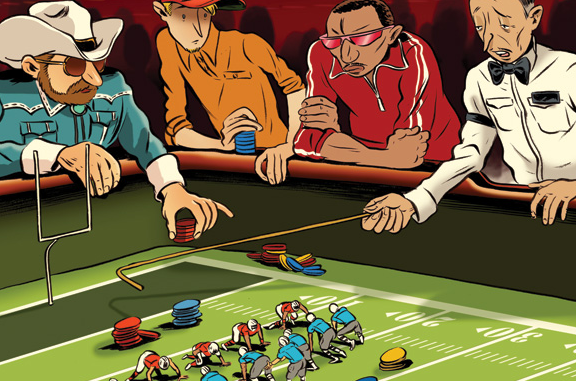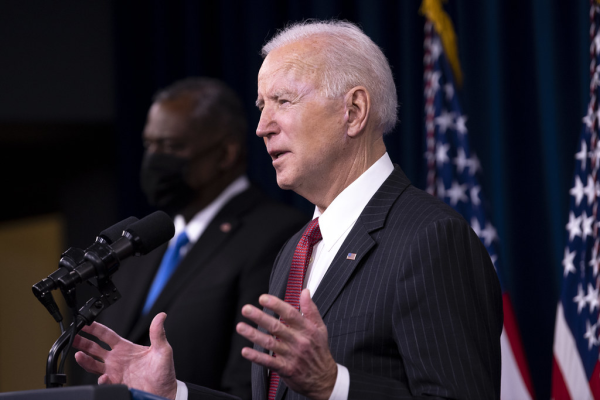Fantasy Football: Dangerous Gateway to Gambling?

Image courtesy of https://dubsism.wordpress.com
Is this how students feel about fantasy football?
Although he’s a dedicated New Orleans Saints fan, eighth grader Ned Murphy roots hard for the Atlanta Falcons, one of the Saints’ division rivals, to score as much as possible each week. Why? Well, because Murphy plays Fantasy Football, and Falcons wide receiver Julio Jones is one of his “players.”
Welcome to the world of fantasy sports, where your allegiance to your favorite team can be compromised depending on who you have on your fantasy roster. Fantasy sports are online leagues where you’re the coach and the owner. You join a league, draft players from various actual professional sports teams, and then your handpicked team competes against other online users’ teams in your league.
With the rise of the Internet in the Information Age, the popularity of fantasy sports, especially fantasy football, has exploded. According to Zing.com, approximately 75 million people are playing fantasy football this year, and about twenty percent of that population are students eighteen and under.
There are fantasy options for all four major North American sports (baseball, basketball, football, and hockey), but football seems to be the most popular amongst students at TBS.
“I love fantasy football because it gives me another way to do something exciting with my friends,” said eighth grader Jason Blum. “It’s fun discussing [our teams] and debating about [them].”
Users can play in a league (which are sponsored by sites such as ESPN.com, NFL.com, Yahoo Sports, etc.) with family, friends, or even strangers. Once fantasy football users draft their NFL players (which usually consist of mostly offensive players and a team defense), the players earn users points based on their performances during actual NFL games on a week-to-week basis. In most leagues, users play against a single opponent each week. The user whose fantasy team has the most cumulative points based on his NFL players’ statistics from that week wins the game. Most leagues also have a playoff format so that there is a clear winner at the end of each season.
The fun lies in the competition and following the NFL games each week to see how one’s fantasy players perform. This directly affects the points one’s fantasy team accumulates. And while many students play for bragging rights amongst their friends, some students up the stakes and play for cash.
“My parents know [that I play for money],” said one student who plays. “They don’t really care because I don’t play for much, but they’re a little concerned that I’m gambling.”
According to Ipos, an online news website, between betting and signing up for sites that require a registration fee, an average of $800 million per year is spent on fantasy sports. Playing for money certainly puts a bigger competitive spin on fantasy football. For instance, when there’s money at stake, it may motivate users to pay extra close attention to NFL team and individual statistics, certain teams’ offensive and defensive philosophies, and even the game-day weather.
But is there a danger to school-age students wagering money in their fantasy leagues? Do fantasy sports promote gambling habits that may spell disaster for school-age children if they carry those habits over into adulthood?
According to a 2008 national study conducted by the University at Buffalo’s Research Institute on Addictions and sponsored by the National Institute on Mental Health, 750,000 teens have gambling concerns in the U.S. In addition, sixty-eight percent of the youth interviewed reported that they had gambled at least once in the past year, and 11 percent of the youth surveyed gambled twice per week or more, a rate that has traditionally been used to describe “frequent” gambling. A total of 2,274 U.S. youth were surveyed from August 2005 through January 2007 for the study.
The summary of the study’s results were published in the June 2008 issue of the Journal of Gambling Studies and on psychcentral.com, an award-winning site and the Internet’s largest and oldest independent mental health social network.
“As might be expected, all statistically significant results showed that greater gambling involvement is associated with aging into an adult status,” said John W. Welte, Ph.D., principal investigator of the study. “In fact, gambling may be associated with the transition into adulthood.”
At TBS, the administration and faculty try to warn students about the dangers of gambling, drugs, and alcohol use so they don’t get entangled in dangerous addictions later on in life.
“The adolescent mind is very susceptible to addiction,” commented Mr. Hagy. “We try to get kids into better habits. We’re teaching kids not to smoke and not to take that first sip of alcohol until they’re twenty one. The mind gets programmed, and later on we don’t want these kids’ minds to be programmed to bad habits like [gambling].”
So while gambling as an adolescent may not be a good idea, it seems as though every NFL broadcast and sports website is inundated with ads from sites such as Draft Kings or Fan Duel which encourage people to play fantasy football for money. Of course, these sites stipulate that individuals must be at least 18 years of age in order to participate, but some adolescents still gamble amongst themselves.
Regardless of the optional gambling that may go along with fantasy football, it is certainly a great learning tool. Those who play it are passionate about it and thus use every resource at their disposal to succeed and win. While so doing they are involuntarily honing their research skills, their analytical skills, and their ability to form successful working partnerships. These are all skills that will serve Benjamin students with their future professional lives. And how our students succeed in life is no fantasy; it is an important reality!














